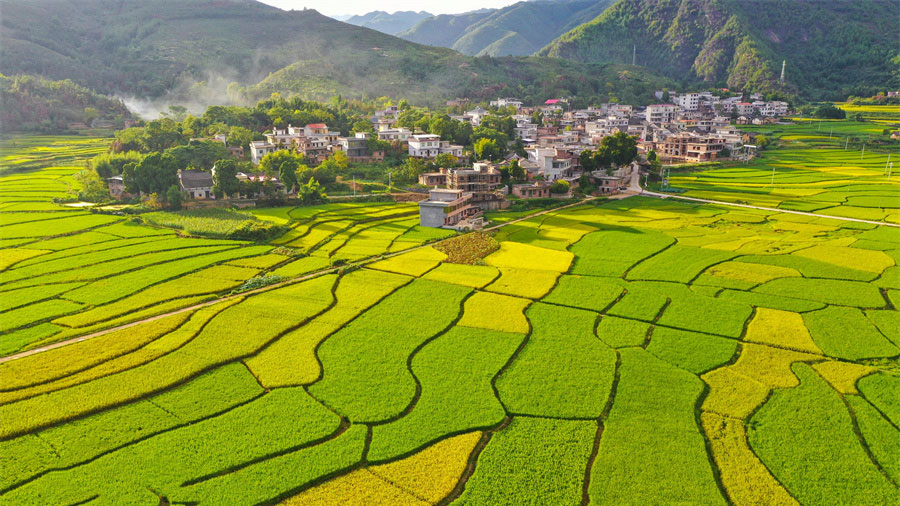19th Asian Games, an economical, spectacular sporting extravaganza
HANGZHOU, Sept. 21 (Xinhua) -- Inside the velodrome of a sports center in Chun'an County, east China's Zhejiang Province, the wooden track shines brilliantly under the sunlight streaming through the glass ceiling, casting a radiant glow throughout the facility.
Perhaps unbeknownst to many, this velodrome, one of the 56 competition venues for the upcoming 19th Asian Games, saved some 9 million yuan (about 1.25 million U.S. dollars) by renting its 374 red pine wood planks.
Such an economical approach has been a common practice for the Asiad in Hangzhou, scheduled from Sept. 23 to Oct. 8.
Of the 56 competition venues, only 12 are newly built, while the rest have been rebuilt or are intended for temporary use, all constructed using recyclable and renewable materials.
At the velodrome, the redesign of the venue's dynamic structure resulted in a 30 percent reduction in rolled steel consumption. In Hangzhou Dianzi University's gymnasium, more than 5,000 seats, which had been in use for 17 years, were skillfully refurbished, creating a distinctive azure spectacle. Moreover, at the Shangcheng Sports Center Stadium in Hangzhou, the repurposing of solar film and seats significantly contributed to cost savings.
Meanwhile, in hotels and cafeterias, eco-friendly choices -- such as clothing hangers crafted from wheat straws, degradable forks and knives, and bowls and plates made from rice hulls -- have been a topic of interest among athletes and journalists.
Undoubtedly, this economical approach has made sustainable development a tangible reality in the preparation of the Hangzhou Asian Games. Comprehensive plans have been mapped out for 51 of the 56 competition venues for their future use.
Hangzhou and five other co-host cities have also made plans to integrate the infrastructure for the Asiad with their own municipal development. They have taken the event as an opportunity to improve the public fitness service system.
For instance, the Keqiao Yangshan Sport Climbing Center in the city of Shaoxing will serve as a juvenile rock climbing center and a multi-functional venue for product launches and live music events after the Asiad.
SPECTACULAR SPORTING EVENT
Apart from being an economical and green Asian Games, it will also be a splendid sports gala showcasing modern technology and traditional Chinese culture.
Robot dogs, facial recognition and driverless buses, among others, have been deployed for the Games.
Raman Vikneswaran, a journalist from Malaysia, was particularly impressed by the network infrastructure inside the games village housing athletes, referees and media workers. "The village seems modern and intelligent, and its smart system brings much convenience to my work," he said.
A notable feature of Hangzhou's efforts to host "smart Games" is the digital torchbearer program, enabling participation in the torch relay for all smartphone users.
Launched on June 15, the online torch relay allows the participation of not only Chinese citizens but smart terminal users from more than 40 Asian countries.
Multiple cutting-edge technologies, such as artificial intelligence, cloud services and blockchain, have been used to develop this digital torch relay.
"We also use AI face pinching and AI motion capture technologies to customize the torchbearers' personal image," said Fang Kai, technical director of the online service.
Such digital technologies have helped break the limitation of time and space in this sporting event, making the event operation smarter, bringing more convenience to athletes, and enabling citizens to watch games right on their mobile phones.
Another prominent aspect of the Games is the rich infusion of fine traditional Chinese culture. Hangzhou, with its breathtaking natural landscapes and vibrant cultural heritage, was hailed by Marco Polo as "the City of Heaven, the most beautiful and magnificent in the world" in the late 13th century.
Throughout the centuries, Hangzhou has served as an inspiring muse for countless renowned poets, whose verses have been engraved in the hearts of the Chinese people since childhood.
The city's rich cultural elements are showcased in the designs of the Asiad medals, torches, sporting venues, and more. For instance, the three mascots -- Congcong, Lianlian and Chenchen -- drew inspiration from Hangzhou's three UNESCO World Heritage sites, namely, the Archaeological Ruins of Liangzhu City, the West Lake and the Grand Canal.
The upcoming Asiad will feature traditional Chinese sports like martial arts and dragon boat racing, offering spectators a chance to immerse themselves in the captivating allure of Chinese culture.
The Games -- one of the largest sporting events in the world -- has attracted about 12,500 top athletes from 45 countries and regions. China's 886-strong squad, featuring many familiar faces like Olympic champions Ma Long, Zhang Yufei and Sun Yiwen, will be competing at the Games.
Hailing the Games as grand and popular among Asian countries, Seungkwan Yoo, a photographer from the Republic of Korea, said his country sent a delegation of 1,140 players to compete in 39 events, the largest delegation in the country's history of the Asian Games.
"China is so professional in hosting such events, and has the capacity to do it well. I'm so looking forward to the Games," said Mohamad Sabzalijamaat, a journalist from Iran.
Photos
Related Stories
Copyright © 2023 People's Daily Online. All Rights Reserved.









